|
|
|
Sort Order |
|
|
|
Items / Page
|
|
|
|
|
|
|
| Srl | Item |
| 1 |
ID:
142226
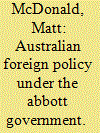

|
|
|
|
|
| Summary/Abstract |
While foreign policy featured prominently on the Australian political agenda in late 2014, the manner of Australia's engagement with the world challenges the idea of a ‘pivot’ from domestic politics to foreign policy. In particular, the government demonstrated a tendency to prioritise domestic political considerations, in particular public opinion, in its dealings with the outside world. This was evident across a range of issue areas: from the ‘internationalist’ agenda of asylum, climate change and aid to more traditional concerns such as bilateral relations with Indonesia and international security. This article explores these dynamics and asks what implications this has for both Australian foreign policy and theoretical accounts of the role and desirability of public engagement with foreign policy in international relations thought.
|
|
|
|
|
|
|
|
|
|
|
|
|
|
|
|
| 2 |
ID:
142229
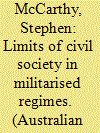

|
|
|
|
|
| Summary/Abstract |
The nature of civil society is transformed by a strong military presence, which occurs in the Asia-Pacific region. While modern civil society survives under military rule through co-optation, veiled resistance or geography, traditional organisations may continue to threaten the state's dominance of political society. This article examines the nature of civil society in two countries in the Asia-Pacific that have recently emerged from direct military rule—Burma and Fiji. It considers the independence of civil society under military rule, how militaries take steps to safeguard their roles in political society, and how democratic postures change during transitions away from military rule. Understanding how militaries preserve their influence provides a better perspective of authoritarian resilience in the region and the limits to democratic reforms.
|
|
|
|
|
|
|
|
|
|
|
|
|
|
|
|
| 3 |
ID:
142228
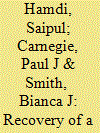

|
|
|
|
|
| Summary/Abstract |
This article examines the ways in which one of Indonesia's largest local, non-violent fundamentalist Islamist groups, Hidayatullah, has worked towards recovering a non-violent identity in the aftermath of allegations of terrorism made by the international community at the height of the War on Terror. Significantly, in international circles post-September 11, Indonesia's pesantren (Islamic boarding school) network more generally became associated with terrorism as they were seen as potential breeding grounds for Islamist extremism. Subsequently, allegations emerged implicating Hidayatullah as part of an extremist organised network linked to Jemaah Islamiyah and, by extension, Al Qaeda. The article demonstrates how, in the aftermath of the allegations, the group negotiated with the wider society and the state's national security laws on terrorism as it worked to recover its non-violent identity. In doing so, it also raises further questions about methodological practices in distinguishing between the heterogeneity and subjectivities within wider Islamist movements, especially in terms of militant and non-violent forms of Islamism.
|
|
|
|
|
|
|
|
|
|
|
|
|
|
|
|
| 4 |
ID:
142230
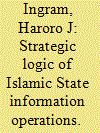

|
|
|
|
|
| Summary/Abstract |
Drawing on English and Arabic Islamic State (IS) communiqués produced by its central media units, wilayat information offices and broader supporter base, this study examines the strategic logic of IS information operations (IO). It argues that the overarching purpose of IS's IO campaign is to shape the perceptions and polarise the support of audiences via messages that interweave appeals to pragmatic and perceptual factors. Pragmatic factors—such as security, stability and livelihood—are leveraged in IS messaging by promoting the efficacy of its politico-military campaign and denigrating its enemies’ efforts via rational-choice (logic of consequence) appeals. Perceptual factors—which are tied to the interplay of in-group, Other, crisis and solution constructs—are leveraged via identity-choice (logic of appropriateness) appeals that frame IS as the champion of Sunni Muslims (the in-group identity), its enemies as Others complicit in Sunni perceptions of crisis, and IS as the only hope for solving this malaise. With this approach, IS seeks to resonate its message across a diverse ‘glocal’ constituency and supercharge supporters towards action. IS simultaneously targets its enemies with messaging that manipulates the inherent dualities underlying perceptual and pragmatic factors, vigorously counters criticisms and ‘baits’ opponents into ill-conceived IO responses.
|
|
|
|
|
|
|
|
|
|
|
|
|
|
|
|
| 5 |
ID:
142227
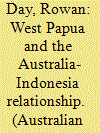

|
|
|
|
|
| Summary/Abstract |
This article is a study of West Papua's impact on the relationship between Australia and Indonesia. Its purpose is to enhance understanding of various diplomatic challenges emerging from West Papua, the origins of these challenges, and how they impact upon the relationship. This will be achieved through an analysis of a particular incident in 2006 in which 43 West Papuan refugees arrived in Australia. This led to a diplomatic storm between the Indonesian and Australian governments, and a highly charged public debate. Insights will be gleaned from the incident and its aftermath to broaden our understanding of West Papua's impact on the Australia-Indonesia relationship.
|
|
|
|
|
|
|
|
|
|
|
|
|
|
|
|
|
|
|
|
|